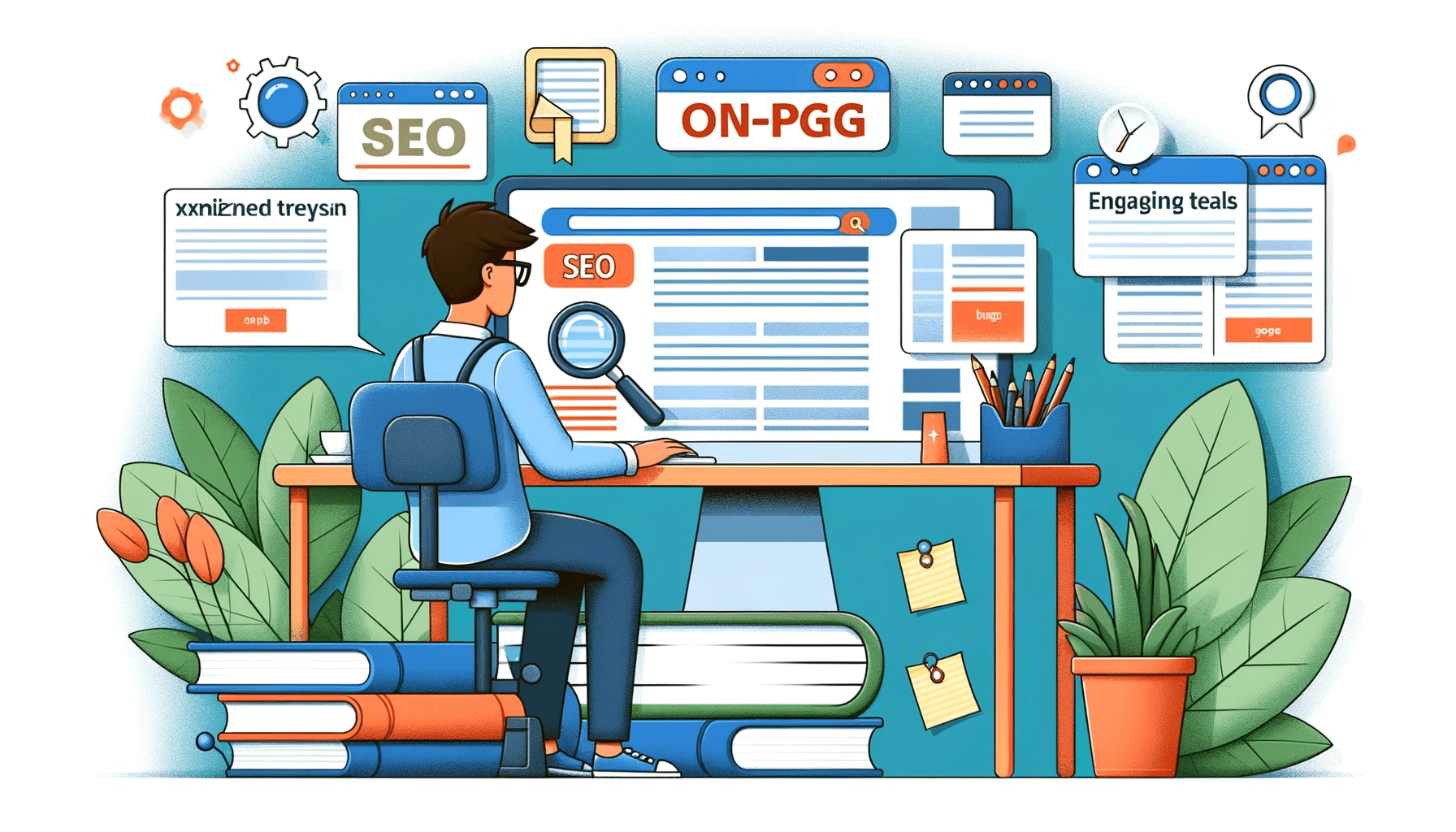Introduction: The four 4 areas of SEO to get right.
Search Engine Optimisation (SEO) is a critical factor in the digital success of any website. Yet, many businesses, including those launching new sites, often face the perplexing question: "Why is my website ranking poorly?" Understanding the multifaceted nature of SEO is key to unravelling this mystery.
On-Page SEO Missteps
On-page SEO is the foundation of your site's visibility. It involves keyword research and optimisation, ensuring your content aligns with what your audience is searching for High-quality, relevant content, paired with a well-organised website structure, plays a pivotal role in enhancing your search engine ranking.

Keyword Research and Optimisation
The foundation of on-page SEO lies in effective keyword research and optimisation. This process begins with understanding your target audience's needs and the search terms they use. Tools like Google Keyword Planner, SEMrush, or Ahrefs are invaluable in this endeavour, helping you uncover keywords that are relevant yet not overly competitive. Once identified, these keywords should be naturally integrated into your website's content, including titles, headers, and body text, while avoiding the pitfall of keyword stuffing which can negatively impact rankings.
Content Quality and Relevance
After establishing the right keywords, focus on the quality and relevance of your content. It's not just about sprinkling keywords; it’s about crafting content that truly resonates with your audience. This involves creating informative, engaging, and well-structured content. Regular updates, user research, and readability checks enhance content quality. Remember, Google rewards content that provides value to the reader, so prioritise creating substantial and insightful articles that address your audience's queries and interests.
Website Structure and Organisation
A well-organised website facilitates not only a better user experience but also easier navigation for search engines. A clear, logical structure with a hierarchical arrangement of pages, along with a straightforward navigation menu, aids both users and search engines in finding information quickly. Header tags should be used effectively to structure your content, and your URL structure should be descriptive yet concise. Additionally, optimising images by using descriptive file names and alt text plays a crucial role in on-page SEO. All these elements collectively improve your site's usability and SEO performance.
Incorporating these detailed elements into your on-page SEO strategy can significantly enhance your website's visibility and ranking. By focusing on thorough keyword research, high-quality content, and a well-structured website, you lay a solid foundation for your SEO efforts. Remember, on-page SEO is an ongoing process that requires regular updates and optimisation to keep up with changing trends and algorithms.
On-Page SEO Checklist
Conduct Thorough Keyword Research: Use tools like Google Keyword Planner, SEMrush, or Ahrefs to identify relevant, moderately competitive keywords.
Focus on Content Quality and Relevance: Create informative, engaging content that is well-structured and meets the needs of your target audience.
Optimise Website Structure: Ensure your website has a clear, logical structure, with a user-friendly navigation menu and effective use of header tags.
Optimise Images and URLs: Use descriptive file names and alt text for images and keep URLs concise and descriptive.
Regularly Update and Monitor SEO Performance: Continuously update your content and SEO strategy to adapt to changing trends and algorithms, and monitor your site's performance.
Off-Page SEO Oversights
Off-page SEO extends beyond your website. It includes building quality backlinks, which are crucial for establishing your site's authority and trustworthiness. Additionally, a robust social media presence can amplify your SEO efforts, while local SEO is essential for businesses targeting specific geographic areas.

Beyond Your Website's Boundaries
Off-Page SEO plays a crucial role in determining a website's overall authority and ranking in search engine results. Unlike on-page SEO, which focuses on optimising elements within your site, off-page SEO involves all activities done outside of your website to improve its position in search rankings.
The Importance of High-Quality Backlinks
Building high-quality backlinks is a cornerstone of off-page SEO. Backlinks, or links from other websites to your site, are vital indicators of your site's authority and relevance. However, it's not just about the quantity of backlinks; the quality matters significantly. Acquiring links from reputable and relevant websites contributes positively to your site's search engine ranking. Engaging in outreach, guest blogging, and creating shareable, valuable content can help in attracting these high-quality backlinks.
Leveraging Social Media for SEO
Social media's influence on SEO, while indirect, is undeniable. A robust social media presence can enhance your online visibility, leading to increased traffic and potential backlinks. Regular posting of relevant and engaging content on social media platforms can attract a larger audience, encourage shares, and eventually drive more traffic to your website. Social media can also be a platform to connect with influencers and other brands for potential collaborations that can boost your site's exposure.
Mastering Local SEO
For businesses with a physical location or a local service area, local SEO is vital. Optimising your Google My Business listing, ensuring your NAP (Name, Address, Phone number) information is consistent across the web, and getting listed in local directories can significantly boost your local search visibility. Encouraging and responding to online reviews also plays a part in strengthening your local SEO efforts.
Encouraging and Managing Customer Reviews
Customer reviews are an integral part of off-page SEO, especially for local SEO. Positive reviews not only enhance your business's credibility but also signal to search engines that your business is trustworthy and reputable. Encourage satisfied customers to leave reviews on platforms like Google My Business and Yelp. Monitor these reviews and respond appropriately to both positive and negative feedback.
Monitoring and Analysing Your Backlink Profile
Regularly monitoring your backlink profile is essential in off-page SEO. Tools like Ahrefs and SEMrush provide insights into who is linking to you, the quality of these links, and opportunities for improvement. This ongoing analysis ensures that your backlink profile remains strong and beneficial to your SEO efforts.
In summary, off-page SEO is a multifaceted approach involving building quality backlinks, leveraging social media, focusing on local SEO, managing online reviews, and constantly monitoring your backlink profile. These strategies collectively enhance your website's authority and ranking in search engine results, complementing your on-page SEO efforts.
Off-Page SEO Checklist
Build High-Quality Backlinks: Focus on acquiring backlinks from reputable, authoritative websites in your industry.
Develop a Strong Social Media Presence: Actively engage on social media platforms to boost your online visibility and attract potential backlinks.
Engage in Local SEO Strategies: If applicable, optimise for local search by claiming your Google My Business listing and getting listed in local directories.
Encourage Customer Reviews: Solicit reviews from customers on your Google My Business profile and other relevant platforms to improve credibility and local SEO.
Monitor Your Backlink Profile: Regularly use tools like Ahrefs or SEMrush to analyse and improve your backlink profile, ensuring you maintain high-quality links.
Technical SEO: Often Overlooked
Technical SEO aspects like website speed, mobile-friendliness, and proper indexing are often overlooked but are vital for ranking. A slow website or one that isn't mobile-friendly can significantly hinder your SEO performance

Technical SEO: The Backbone of Your Website's Performance
Technical SEO refers to optimising the technical aspects of a website to enhance its ranking in search engines. It's an essential part of SEO that ensures a website meets the technical requirements of modern search engines, thus improving organic rankings.
Website Speed and Mobile-Friendliness
Speed is a critical factor in user experience and search rankings. A slow website can lead to higher bounce rates and lower user engagement. Optimising loading times, compressing images, and reducing server response time are key steps to speed up your website. Equally important is mobile-friendliness. With mobile-first indexing, Google prioritises the mobile version of content for indexing and ranking. Ensuring your website has a responsive design that adjusts content to fit different screen sizes is crucial.
Crawling and Indexing Optimisation
For a website to appear in search results, it first needs to be crawled and indexed by search engines. Ensuring search engines can easily crawl your website involves creating a well-structured sitemap and submitting it to search engine tools like Google Search Console. Avoiding deep nesting of pages and having a clear, logical URL structure also aids in better crawling and indexing. Regularly monitoring your website for crawl errors and fixing broken links are essential practices to maintain website health.
Utilisation of Schema Markup and Structured Data
Schema markup and structured data are code snippets that help search engines understand the content on your website. Implementing schema can enhance how your website appears in search results, potentially increasing click-through rates. It's particularly useful for specific types of content like events, recipes, or product listings. Utilising schema.org is standard practice for adding structured data to web pages, making them more informative and attractive in search results.
Website Security and HTTPS
Website security is a critical component of technical SEO. Ensuring your website uses HTTPS, which encrypts data between the browser and the server, is crucial for website security. Google has confirmed HTTPS as a ranking signal, with secure sites possibly receiving a ranking boost over non-secure sites. Regularly updating software, using security plugins, and implementing security best practices are essential to maintain the integrity and trustworthiness of your site.
Error Management and Website Health
Regularly checking for errors like 404 pages and fixing them promptly is important for maintaining a healthy website. Using tools like Google Search Console can help identify and resolve such issues. Ensuring that redirects are correctly implemented, particularly after website changes or migrations, is crucial to maintaining link equity and user experience.
Technical SEO is a vital element that supports the overall performance of your website in search engine rankings. Focusing on aspects such as site speed, mobile-friendliness, crawling and indexing, schema markup, website security, and error management can significantly impact your website's ability to rank higher in search results.
Technical SEO Checklist
Enhance Website Speed and Mobile-Friendliness: Optimise your website to load quickly and ensure it is responsive on mobile devices.
Ensure Efficient Crawling and Indexing: Create and maintain a clear sitemap, and ensure your website is easily crawlable by search engines.
Implement Schema Markup and Structured Data: Use schema markup to help search engines understand and display your content more effectively.
Maintain Website Security with HTTPS: Secure your website with HTTPS to protect user data and potentially boost your search rankings.
Regularly Monitor and Fix Site Errors: Check for and address website errors like broken links and 404 pages to maintain a healthy and user-friendly website.
Common Pitfalls in SEO Strategies
Many sites suffer from targeting overly competitive keywords or creating content that doesn't align with user search intent. Moreover, thin, poorly optimised content can negatively impact your ranking.

Navigating the SEO Minefield
SEO is a dynamic field, and it's easy for website owners to fall into certain common traps. Understanding these pitfalls is crucial for maintaining and improving your website's search engine rankings.
Neglecting Search Intent
One of the most critical errors in SEO is not aligning content with the user's search intent. Creating content that matches what users are actually searching for is key. For example, if users are looking for information, but your page is overly promotional, it may not rank well. Understanding and matching the search intent – whether informational, transactional, or navigational – is essential for SEO success.
Choosing Highly Competitive Keywords
Targeting highly competitive keywords without the necessary authority or content depth can be a major setback. Newer or smaller websites should focus on less competitive, long-tail keywords that offer a better chance of ranking higher. Over time, as your site gains authority, you can start targeting more competitive keywords.
Producing Thin, Low-Quality Content
Websites often fail to rank due to thin or low-quality content. Content that lacks depth, insight, or fails to fully address user queries won’t perform well in search rankings. Expanding content to be more comprehensive, detailed, and user-focused is crucial. Quality always trumps quantity in SEO.
Ignoring Mobile Optimisation
With the increasing prevalence of mobile searches, ignoring mobile optimisation is a significant oversight. A mobile-friendly website is not just a convenience but a necessity. Google’s mobile-first indexing means the mobile version of your content is used for indexing and ranking. Ensuring your website is responsive and offers a seamless mobile experience is vital.
Overlooking Local SEO
For businesses that operate in specific geographic areas, neglecting local SEO can result in missed opportunities. Local SEO involves optimising your website to appear in local search results, which includes managing your Google My Business listing, getting reviews, and ensuring local citations are accurate and consistent.
Avoiding these common pitfalls in your SEO strategy is essential for the success of your website. By focusing on user intent, targeting achievable keywords, creating quality content, optimising for mobile, and paying attention to local SEO, you can significantly improve your website’s search engine performance and avoid the traps that hinder many SEO efforts.
SEO Strategy Checklist
Align Content with Search Intent: Create content that matches what users are actively searching for.
Focus on Long-Tail Keywords: Target less competitive, long-tail keywords suitable for your site's authority level.
Produce Comprehensive, High-Quality Content: Ensure your content is detailed, insightful, and addresses user queries thoroughly.
Optimise for Mobile: Make sure your website is mobile-friendly and responsive to meet mobile-first indexing standards.
Prioritise Local SEO: For local businesses, optimise for local search with accurate Google My Business listings and local citations.
Getting Help with Your SEO
Mastering SEO is a nuanced journey, but you don't have to navigate it alone. At Tea Powered Projects, we specialise in transforming SEO challenges into opportunities for growth. Our expert team uses a holistic approach, blending on-page optimisation, off-page strategy, technical SEO prowess, and a keen eye for common pitfalls to boost your website's visibility and ranking. Partner with us, and let's power your website to the top of search results, where it rightfully belongs. Connect with Tea Powered Projects today to start your journey towards SEO excellence.
Conclusion
Improving your website's ranking is a multifaceted endeavour requiring attention to on-page and off-page SEO, technical aspects, and a strategic approach to content and keywords. Consistent effort and adaptation to SEO best practices are essential for climbing the search engine ranks.
